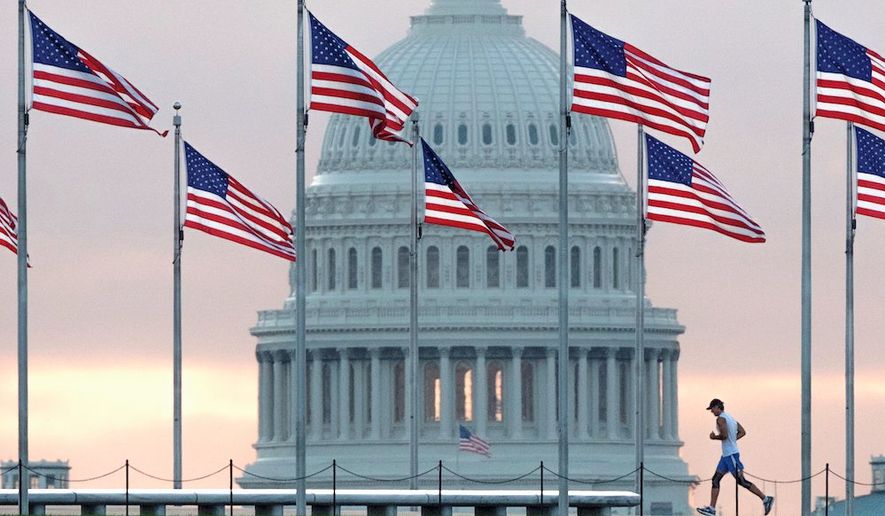NEWS AND OPINION:
Do you dare to express admiration for President Trump in public? Few Americans are in the mood to be candid about their particular political opinions at the moment. Free speech has fallen victim to ongoing cancel culture and often severe partisan hostility. A new Cato Institute survey finds that “self censorship” is a serious issue in the United States, with serious repercussions.
Nearly two-thirds of Americans — 62% — now agree that the current political climate prevents them from revealing what they think. They fear offending or angering those who disagree.
“These fears cross partisan lines. Majorities of Democrats (52%), independents (59%) and Republicans (77%) all agree they have political opinions they are afraid to share,” the poll analysis said.
All except one particular demographic, that is.
“Strong liberals stand out as the only political group who feel they can express themselves. Nearly 6 in 10 (58%) of staunch liberals feel they can say what they believe,” the poll said.
“Centrist liberals feel differently. A slim majority (52%) of liberals feel they have to self- censor, as do 64% of moderates, and 77% of conservatives. This demonstrates that political expression is an issue that divides the Democratic coalition between centrist Democrats and their left flank,” the poll said, noting that one-third of all Americans fear their job could be threatened by their political views.
Meanwhile, the survey confirms there’s a rift between “centrist” and “staunch” liberals in the Democratic Party. Leery of veering further left on the progressive path, these centrist voters may warm to the idea of casting a vote for Mr. Trump when the time comes.
The poll of 2,000 U.S. adults was conducted July 1-6.
THEY WANT TO RESCUE AMERICA
One pro-Trump organization has launched a series of “Rescue America Rallies” with distinct intent.
“It’s time to take our country back from radical leftists,” says Brandon Straka, founder of the WalkAway Campaign, an interest group that encourages disgruntled Democrats to walk away from their party and give President Trump a chance.
“We have to show moderate Democrats that they have a movement to join where they are welcome to once again engage in common sense, love of country, and American kindness and decency,” says Mr. Straka, who is particularly vexed by Attorney General William Barr’s treatment during an appearance before the House Judiciary Committee this week.
“America is in such trouble right now. She needs us. Not only is she being savagely attacked by radicals, but the Democrats and liberal media are helping to cover it up. Let’s take out the trash together and get these people out of power,” suggests Mr. Straka.
The group stages its second Rescue America rally Saturday in Sacramento, California, and plans similar events each week. Find them at Walkawaycampaign.com.
“We will no longer tolerate the destruction of property and lives, the vilifying of law enforcement, and the weaponization of tragedies. Our silence has been our consent! It is time for the Silent Majority to become unsilent,” the organization said in its public invitation.
HEADLINE OF NOTE
“Congress’ approval drops to 18%, Trump’s steady at 41%,” notes a new Gallup poll headline.
That is promising news for President Trump, given the current state of the nation amid social unrest, COVID-19 and saber-rattling here and there around the world. A take-away treat: Mr. Trump has the support of 91% of Republican respondents in the poll, conducted among 1,007 U.S. adults from July 1-23.
THE IDENTITY TRANCE
The Oxford Dictionary offers a handy definition “identity politics,” describing it as “a tendency for people of a particular religion, race, social background, etc. to form exclusive political alliances, moving away from traditional broad-based party politics.”
Mike Gonzalez, a senior fellow at the Heritage Foundation, explores the fallout of it all in his new book “The Plot to Change America: How Identity Politics is Dividing the Land of the Free,” which was published Thursday by Encounter Books.
“We have identity politics today because our government has created ethnic and sexual categories whose members have been instilled with resentments against the country and its system, and given real financial benefits for nursing their grievances. Insisting on group grievances thereby perpetuates the identity groups. If we stop this vicious cycle, we may be able to free ourselves from the grip of identity politics,” writes Mr. Gonzalez.
“We do not have to accept these categories, the discourses of ’privilege’ and ’victimhood,’ or politically loaded (and recent) terms such as ’minorities,’ ’diversity,’ and ’persons of color.’ Rather, I seek to snap the country out of its identity trance by exposing the actors, their actions, how they came up with these terms, and the theories that led us to this juncture,” the author continues.
“The identity collectives have done nothing to alleviate the very real racial discrimination and social injustice that continues to exist in America — nor were they intended to do so — but have only exacerbated them.”
WEEKEND REAL ESTATE
For sale: Maple Hill House, built in 1790 on two acres in Scottsville, Virginia. Three bedrooms, three baths, original hand-hewn beams, staircase, heart pine floors and wainscoting; 2,694 square feet. Updated electricity, plumbing, baths and kitchen, 13-foot ceilings. Large deck, two on-site original log cabins, mature trees, garden. Priced at $369,000 through ColdwellBankerHomes.com/mid-atlantic.
POLL DU JOUR
• 45% of U.S. adults say COVID-19 cases are increasing in their community; 35% of conservatives, 48% of moderates and 59% of liberals agree.
• 23% overall say the cases are stable and “not changing”; 22% of conservatives, 24% of moderates and 20% of liberals agree.
• 15% overall say cases are decreasing; 22% of conservatives, 16% of moderates and 10% of liberals agree.
• 17% overall are not sure about the number of cases; 20% of conservatives, 12% of moderates and 10% of liberals agree.
Source: A YouGove poll of 1,500 U.S. adults conducted July 26-28.
• Helpful information to jharper@washingtontimes.com.
• Jennifer Harper can be reached at jharper@washingtontimes.com.




Please read our comment policy before commenting.